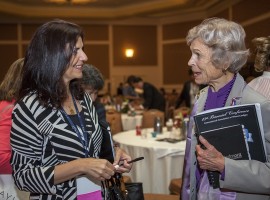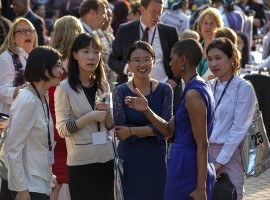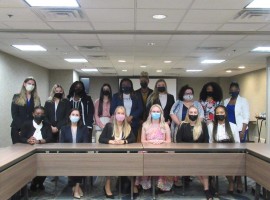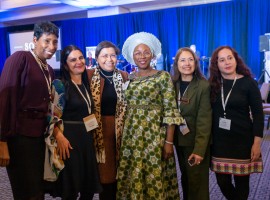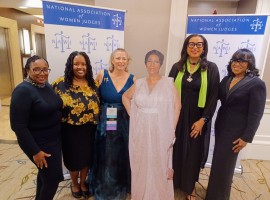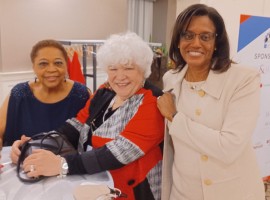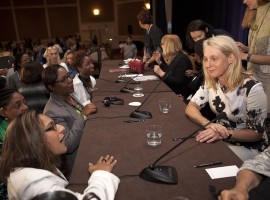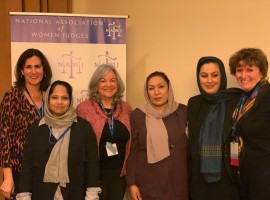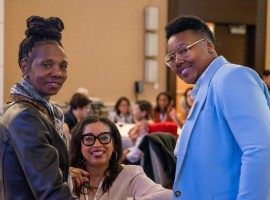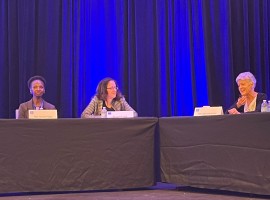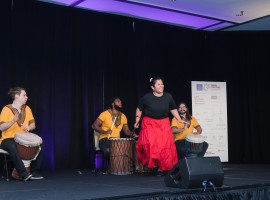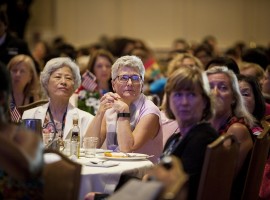NAWJ 2020 Midyear Meeting
Mar 11, 2020 @ 12:00PM - Mar 13, 2020 @ 10:30AM
HOTEL MONTELEONE
214 ROYAL STREET
New Orleans, LA 70130
2020 Midyear Meeting in New Orleans
Near 100 intrepid members, supporters, and friends of NAWJ gathered together in the French Quarter’s historic Hotel Monteleone to explore the meeting’s theme “Bringing Access into Harmony with Justice” in a series of discussions and gatherings that address how the legal community can ensure the basic right of access to justice. Both cognizant of the emerging health crises and fearless in a desire to address ongoing challenges some may face in gaining access to justice, meeting participants examined the ongoing crises in opioid use, human trafficking, trauma in the courts, and combating recidivism.
The Midyear Meeting opened with a lively musical procession by the Mardi Gras Indians, and a Presentation of Colors by young students. NAWJ President, Judge Bernadette D’Souza, warmly welcomed the attendees who filled the beautiful room that was the setting for all of our programs, and who had traveled from as far as Alaska and Massachusetts to gather and share information they could use toward better serving their courts. In addition, Judge D’Souza offered a special tribute to her mentor and friend Louisiana Supreme Court Chief Justice Bernette Joshua Johnson, as she presented Chief Justice Johnson the Lady Justice Award for her long-committed service to her community and the legal profession.
Also, during this Midyear Meeting, NAWJ launched its inaugural Planting the Seed: Pathways to a Legal Career diversity outreach program as developed by Judge Toni Clarke, with the assistance of Judge Julie Weatherly and Judge Lorraine Lee. It is modeled on an ABA Judicial Division program of a similar name. Judge Marcella Holland (in blue in photo) directed the program at the Midyear Meeting. At the meeting, law students were joined by an equal number of judges who enthusiastically shared their stories and career trajectories while offering treasured advice.
The program was a “speed dating” type format, with law students from local law schools spending ten minutes with judges from all over the country across many court types at a table, then moving from table to table providing them with an opportunity to speak with all of the judge participants. The program provided the students with an opportunity for open dialogue on topics such as navigating law school, judicial clerkships, the practice of law, the pitfalls of social media, the path to the bench, career paths, the legal profession, and the value in active participation in bar associations. The program culminated with the law students joining meeting attendees, bar leaders and government officials for a welcome reception at the top of the Hotel Monteleone, whose windowed walls included sweeping views of the majestic Mississippi River, to honor NAWJ President, Judge Bernadette D’Souza, and her caring spirit within its justice system.
The students were thrilled for the opportunity to have access to our members in an informal, supportive setting.
HUMAN TRAFFICKING
NAWJ’s Human Trafficking’ Committee Co-Chairs Judge Ann Breen-Greco and San Diego District Attorney Summer Stephan opened the education portion of the program with an inspiring presentation. While the country struggles to identify people caught up in trafficking’s heinous web, the presentation offered strategies that make a difference.
In 2010, NAWJ identified human trafficking as one of its primary initiatives, and the presentation in New Orleans was a sobering and compelling update on the trafficking scenarios and issues. Human trafficking lies in plain sight, but it lies in the intersections of harm – domestic violence, sexual abuse, child abuse, foster care system breakdowns -- all creating vulnerabilities and creating challenges for the courts. Judges are key in bringing together all the elements and in speeding up the processes and solutions.
Noting that the FBI has a report that highlights San Diego as a leading hotspot for child prostitution, Judge Breen-Greco and attorney Stephan described several San Diego initiatives and organizations that are focusing on the trafficking issues, such as the Trafficking Prevention Education Collective, the Human Trafficking and Commercial Child Sexual Exploitation Advisory Council, and the Human Trafficking Task Force (comprising State, Federal and Local Law Enforcement).
They also highlighted the expanding scope of work with collaborations between the ABA Commission on Domestic and Sexual Violence, ABA Judicial Division Taskforce on Domestic and Sexual Violence, and the nonprofit United Against Slavery, which is surveying judges to determine their needs in the courtroom with respect to human trafficking cases.
Other discussion points revolving around the trafficking issues were addressed by the immediate NAWJ past president the Honorable Tamila Ipema, Judge for the San Diego County Superior Court, on international initiatives including discussions with Pope Francis. The Honorable Elizabeth Lee, Judge for the San Mateo County Superior Court, emphasized the value and importance of multidisciplinary work, such as involving child welfare organizations, juvenile justice organizations, and education initiatives. The current pandemic environment and the related economic environment both present difficult challenges in addressing all the elements of human trafficking.
Summer Stephan is District Attorney for the County of San Diego, California. As District Attorney, she leads the second-largest DA’s office in California, managing a professional staff of 1,000 employees for its more than three million residents. DA Stephan rose through the ranks. As a trial prosecutor, she tried more than 100 jury trials. She served as Chief of the DA’s North County Branch and Chief of the Sex Crimes and Human Trafficking Division, a special-victims unit she pioneered. In June 2018, San Diego County voters elected her as District Attorney. She is co-chair of NAWJ’s Human Trafficking Committee.
The Honorable Tamila E. Ipema is a Judge for the Superior Court of California in San Diego County. She has served as a judicial officer for nearly 15 years. She has experience in family, criminal, and civil courts. She previously practiced as an immigration defense attorney; as an Assistant District Counsel with the U.S. Department of Justice in immigration matters; as a judicial research attorney; and as a supervising research attorney for the Los Angeles Superior Court. She also served as a California Superior Court Commissioner in both Los Angeles and San Diego Counties prior to her appointment as a Judge to the San Diego Superior Court. She was President of NAWJ for the 2018-2019 year. She is active in numerous NAWJ Committees.
The Honorable Elizabeth K. Lee is a Judge for the Superior Court of California in San Mateo County. She was appointed to the bench in July of 2005. She is currently Juvenile Supervising Judge assigned to the Juvenile Court in San Mateo County handling both delinquency and dependency matters. She is the Chair of San Mateo County’s Blue Ribbon Commission on Foster Care Youth and has worked with other stakeholders in the court system to address the problem of human trafficking of minors. Prior to joining the bench, she worked as an Assistant United States Attorney for the United States Attorney’s Office in the Northern District of California assigned to the Organized Crime and Racketeering StrikeForce. She served as the Deputy Chief of the Strike Force from 1999 –2005.
SEPARATING MIGRANT FAMILIES - RIGHT OF DUE PROCESS
Over lunch US District Judge Dana Sabraw, United States District Court for the Southern District of California, discussed issues around separating migrant families and the right of due process.
In 2018, Judge Sabraw learned about the allegations that the federal government had embarked upon a policy to separate family members. The evidence came through the media, and via a suit by ACLU, in support of an immigrant mother seeking asylum who had been separated from her young daughter. Judge Sabraw was assigned the case. He eventually dismissed the government’s motion to dismiss the case, claiming that existing caselaw, the Fifth Amendment and due process laws applied to all states, and any person in our country regardless of status is entitled to constitutional rights. More caselaw established under the Fifth Amendment the right to family integrity, bonds between parent and child, unless there is a lack of fitness from the parent. Judge Sabraw ordered an end to most family separations at the southern border and stated that it is the responsibility of the federal government to reunite separated families. During the week of March 10, 2020, the federal government finally dropped its appeals to Judge Sabraw’s rulings against family separation.
The Honorable Dana Sabraw is a U.S. District Court Judge for the United States District Court for the Southern District of California. Judge Sabraw was born in San Rafael, California. He received a Bachelor of Science degree from San Diego State University in 1980, and a Juris Doctor from the McGeorge School of Law at University of the Pacific in 1985. He began his judicial career as a judge on the North County Municipal Court in San Diego County, 1995 to 1998. From 1998 to 2003, he was a judge on the Superior Court for the State of California, County of San Diego. In 2003, he was nominated by President George W. Bush to the United States District Court for the Southern District of California, and confirmed in September, 2003.
AN OVERVIEW OF OPIOIDS LITIGATION
Issues and cases revolving around opioid use were addressed by a three-member panel: The Honorable Susie Morgan is U.S. District Judge for the United States District Court for the Eastern District of Louisiana; Celeste Brustowicz, Esq., an attorney at Cooper Law Firm LLC, New Orleans; Jennifer Fountain Connolly, Esq. a Shareholder in Baron and Budd, Washington, D.C.
In 2017, attorneys filed a petition for an MDL, a multi-district litigation. At the time there were 61 cases pending in 11 federal districts across the country, and the MDL movement asked the panel to consolidate the cases in one federal court. There were common issues about who started the opioid epidemic and who was responsible for cause. The original motion was filed by municipalities in West Virginia, heavily affected by the opioid crisis. This MDL was unique as it was the first time that municipalities asked the court for such consolidation. The tobacco litigation years earlier was led by attorneys general, and the West Virginia municipalities wanted to bring their own cases because they are the entities responding with or in need of expanded public services to combat the crisis. (Individual cases, with few exceptions, were not successful, and people who were addicted were viewed as unsympathetic plaintiffs.)
The over 2700 cases present very complex issues, and were referred to a U.S. District Court for Northern Ohio, where there was experience in addressing addiction litigation; such as the use of bellwether plaintiffs for fast tracking cases, to show the strength of the claims or defenses; separate MDL cases for children who are born opioid dependent; then eventually “strategic remands” back to Chicago, West Virginia, San Francisco, Oklahoma, thus defeating the hope of the bellwether approach.
A separate MDL for children was initiated, as these instances present especially troubling challenges. Children born with neonatal abstinence syndrome (NAS) will likely have learning disabilities among other health traumas. Hospital bills for babies born addicted may be $150,000. NIH estimates that every 15 minutes a baby is born suffering with opioid withdrawal, and yet according to the CDC in January 2019, no national program exists to collect data on opioid births. Other legal elements enter into these scenarios, such as those around foster care, rights of children and parents in foster care scenarios (both state and federal laws are in play here).
Some opioid cases are being brought to state courts, there are mini MDLs in some states, and there are complicated coordination challenges among judges, attorneys general, and municipalities, manufacturers and distributors, and including the idea of a federal judge declaring a nationwide class of municipalities.
The Honorable Susie Morgan is U.S. District Judge for the United States District Court for the Eastern District of Louisiana. She graduated from the Louisiana State University Law Center where she was a member of the Order of the Coif. After graduation, she clerked for Judge Henry Politz who served as Chief Judge of the United States Fifth Circuit Court of Appeal. Judge Morgan handled complex civil litigation cases before becoming a United States District Court Judge for the Eastern District of Louisiana in 2012. During her eight years on the bench, Judge Morgan has handled class actions, mass actions, and other cases with large members of claimants. In that context, she has dealt with many of the issues frequently encountered in MDL’s, including detailed case management orders, complicated discovery disputes, and selection of bellwether plaintiffs.
Celeste Brustowicz, Esq., is an attorney at Cooper Law Firm LLC, New Orleans. She has managed all aspect of civil litigation, including Mass Tort and Class actions. Prior to joining Cooper Law Firm, she managed all aspect of civil litigation, including medical malpractice, commercial litigation, insurance defense, insurance coverage, construction, government entities defense, products liability, premise liability and civil rights matters for Burglass & Tankersley, LLC, having rejoined the firm in 2011 through 2018. She performed similar roles for Rinos & Martin, LLP in Tustin, California from 2005-2011. At Burglass & Tankersley, LLC. she managed medical malpractice litigation for hospitals, physicians, and other health care providers in state and federal court as lead counsel from 2000-2004. At Bienvenu, Foster, Ryan & O’Bannon she served as lead counsel for the firm, who specialized in insurance defense, as its first and only female partner from 1987-2000.
Jennifer Fountain Connolly, Esq. is a Shareholder in Baron and Budd, Washington, D.C.
She has two decades of experience leading national, complex litigation matters including antitrust, pharmaceutical and consumer fraud class actions, qui tam cases, and cases brought by state attorneys general and other governmental entities. Ms. Connolly has held significant roles in many of the largest pharmaceutical class actions and state attorney general cases in the last ten years. She currently represents the States of Ohio, Mississippi, Arkansas and Louisiana, as well as several municipalities in their cases against manufacturers and distributors of opioids, and leads the litigation filed by those entities. She is a graduate of the University of Denver, Sturm College of Law (J.D. 1998), and the University of Chicago ( B.A. 1993).
JUDGES FACING THE THREAT TO THE RULE OF LAW
At an afternoon session, four panelists addressed the difference and the gap between justice and the law. Panelists were The Honorable Judith Chirlin retired from the Los Angeles Superior Court in 2009 and currently Executive Director of the Western Justice Center in Pasadena, California. Bill Quigley is a law professor and Director of the Law Clinic and the Gillis Long Poverty Law Center at Loyola University New Orleans. The Honorable Jay C. Zainey is Judge to the United States District Court for the Eastern District of Louisiana. The Honorable Lisa Walsh is a Circuit Court Judge, currently presiding in the criminal division of the 11th Judicial Circuit of Miami-Dade, Florida, and NAWJ President for 2015-2016 year.
We heard about the following relatively common scenarios: for civil cases in general, three quarters of cases have at least one person not represented, for example women asking for protective orders by themselves without counsel; most people who lose their homes never had counsel; demographics of members of the bench in many jurisdictions are not representative of the population served.
The panelists described a variety of needs and services and organizations that are beginning to address this gap. For example, we need to quantify the problem of a frequent mismatch between bench and community demographics. We need to find ways to make pro-bono work more attractive. Perhaps some type of work can be “de-lawyered” by modifying the idea of “the unauthorized practice of law “, such as with foreclosures. One program described has lawyers and law students and law firm secretaries volunteering to provide legal assistance in homeless shelters. Another program makes it easier for persons who have served their sentences to have their liberties restored where allowed, with the assistance volunteer lawyers, law and administrative clerk support, etc.
The Honorable Judith Chirlin retired from the Los Angeles Superior Court in 2009. In November of 2011, she became Executive Director of the Western Justice Center in Pasadena, California. WJC designs and promulgates programs to foster alternative dispute resolution in the courts and peaceful resolution of conflicts in schools and communities; she retired from that rile in 2019. he also works part-time in private dispute resolution; she has started a non-profit foundation to support justice system improvement projects that enhance the rule of law. She also continues in her work in the international arena.
Bill Quigley is a law professor and Director of the Law Clinic and the Gillis Long Poverty Law Center at Loyola University New Orleans. He has litigated numerous cases with the NAACP Legal Defense and Educational Fund, Inc., the Advancement Project, and with the ACLU of Louisiana where he was General Counsel for over 15 years. He has been an active lawyer with School of the Americas Watch and the Institute for Justice and Democracy in Haiti. He served as Legal Director of the Center for Constitutional Rights in NYC from 2009 to 2011 before returning to Loyola.
The Honorable Jay C. Zainey was appointed Judge to the United States District Court for the Eastern District of Louisiana in 2002 after many years as a busy attorney and an active member of the community and the Louisiana State Bar, of which he served as President in 1995-96. While pursuing his successful legal career, Judge Zainey has always found both the time and the means to help those in need, and to enlist others in doing the same. In addition to H.E.L.P., Judge Zainey created SOLACE, and co-founded St. Andrew’s Village, a long-term residential community for adults with developmental disabilities.
The Honorable Lisa Walsh is a Circuit Court Judge, currently presiding in the criminal division of the 11th Judicial Circuit of Miami-Dade, Florida, and has previously served in the civil and dependency divisions. From 2008-2011, Judge Walsh was a County Court Judge assigned to the civil division. Before becoming a judge, she practiced law for sixteen years, in both the trial and appellate state and federal courts, and also served as a Special Master for the City of Miami Beach. Judge Walsh was NAWJ President for 2015-2016 year.
CONVERSATIONS WITH THE LEADING WOMEN OF THE BAR
Added to the New Orleans meeting were two very experienced, committed, and community-focused attorneys who energized the room during a panel discussion facilitated by the Honorable Marcella Holland (ret), Senior Judge on the Circuit Court for Baltimore City and a member of the NAWJ Executive Committee.
Paulette Brown is a Senior Partner, Chief Diversity & Inclusion Officer, and a member of the labor and employment practice group of Locke Lord, LLP, and past president of both the American Bar Association and the National Bar Association. Judy Perry Martinez is Of Counsel and former Partner at Simon, Peragine, Smith & Redfern, and current president of the American Bar Association.
From humble backgrounds in Baltimore and New Orleans, respectively, our panelists followed different paths through and to corporate positions while being effective activists and advocates in their chosen area of the law, for both the community of attorneys and the public. Ms. Brown and Ms. Martinez emphasized the importance of their undergraduate and professional educations. During their education years, they sought and accepted opportunities as they arose or were found or created. Being in the right place at the right time also played a role; they recognized that timing is important, and that timing is not only a passive occurrence.
As they described a variety of legal events and issues, they emphasized that regardless of job and regardless of the specific issue at hand, we must stay nimble and stay the course. In the full range of our law and legal endeavors and responsibilities, including our awareness of long-term projects and our immediate more current environment, such as pandemic issues in the law, we must do our best not only to know the full universe of our court system and both attorney and non-attorney participants, but also we must know the full universe of our public who depend on the judicial process and our ability to provide equal justice.
When we are well informed about all the services and tools and actors in the law, and are both in and of public we serve, we can then draw the connections between these two communities.
For example, Ms. Brown talked of her efforts, outside of her law practice, to visit all 50 states, engaging with a variety of attorneys (public defenders, prosecutors, etc.) and law students AND also with members of the public such as Boys and Girls Clubs of America, and she asked the attorneys and students to join her in these meetings. Ms. Martinez noted the importance of attorneys knowing the importance and role of all levels of the courts, with particular attention to “entry-level” courts, as typically these are where the public has its first encounters with the judicial system.
Both emphasized giving back. It is imperative that we do something to empower someone younger or newer in our profession, to ensure that ladders are always available for colleagues.
2020 Midyear Meeting Sponsors
The NAWJ Midyear Meeting Sponsors have the unique opportunity to connect with a diverse network of judges from all levels of the judiciary across the United States. As a sponsor at the NAWJ Midyear Meeting, you will build relationships, build upon your professional development skills and have the opportunity to promote your organization.
CHAMBERS - $5,000
Becnel Law Firm, LLC
Kara Hadican Samuels & Associates, L.L.C.
BENCH - $2,500
Barrasso Usdin Kupperman Freeman & Sarver, L.L.C.
Dechert LLP
Herman, Herman & Katz LLC
Irwin Fritchie Urquhart & Moore LLC
Thomson Reuters
SECOND LINE - $1,000
Beasley Allen Law Firm
Bruno & Bruno Law
Chaffe McCall L.L.P.
Gainsburgh, Benjamin, David, Meunier & Warshauer, L.L.C.
Galloway Johnson Tompkins Burr & Smith
Jones Walker LLP
Martzell, Bickford & Centola
Louisiana State Bar Association
Louisiana State Bar Association - Section of Civil Law and Litigation
Louisiana State Bar Association - Bench and Bar Section
Louisiana Association for Justice through its sister non-profit entity Bayou Research Institute
The Lambert Firm
LAW SCHOOL
Loyola University New Orleans College of Law
LSU Paul M. Hebert Law Center
Southern University Law Center
Tulane University School of Law
FRIEND OF NAWJ
Joel T. Chaisson, II
Carmen M. Rodriguez, Esq.
Event Details
Highlights from Past Events
